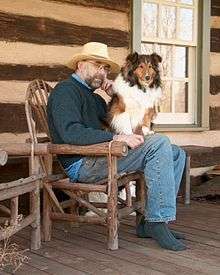Stephen Budiansky
Stephen Budiansky is an American writer, historian, and biographer.[2]
Stephen Budiansky | |
|---|---|
 | |
| Born | March 3, 1957[1] Boston |
| Nationality | American |
| Education | B.S. chemistry; S.M. applied mathematics |
| Alma mater | Yale University, Harvard University |
| Occupation | Writer |
| Website | www |
He is also the author of a number of scholarly publications about the history of cryptography, military and intelligence history, and music.
Early life and career
Stephen Budiansky grew up in Lexington, Massachusetts, and graduated from Lexington High School. He studied science and applied mathematics at Yale University and Harvard University. From 1979 to 1982 he was a magazine editor and radio producer at the American Chemical Society in Washington, D.C.
Journalism and books
Budiansky joined the staff of the science journal Nature as Washington correspondent and later served as its Washington editor. In 1985–86 he was a Congressional Fellow at the U.S. Congress Office of Technology Assessment, where he co-authored a study of advanced conventional weapons technologies as a means for reducing NATO's reliance on nuclear deterrence.[3] In 1986 Budiansky joined the staff of U.S. News & World Report, where he worked for twelve years in a variety of writing and editing positions, covering science and national security issues. He ultimately served as the magazine's deputy editor, the No. 3 editorial position.
Since 1998 Budiansky has been a full-time author and free-lance contributor to publications including the Atlantic Monthly, the New York Times, the Washington Post, and the Economist. His writing has focused on three main areas: intellectual biography; military history; and the evolution and behavior of domesticated animals.
From 2007 to 2008 he was the editor of World War II magazine, where he oversaw a complete redesign and brought in well-known writers and historians to contribute to the publication. He is also a member of the editorial board of Cryptologia, the scholarly journal of codes and codebreaking.
His 2005 article[4] in the Washington Post on the poor quality of school-music repertoire generated considerable attention and controversy among music educators and composers. He subsequently collaborated with Tim Foley, the 26th director of the United States Marine Band, on a scholarly article further exploring the problem and recommending solutions.
Personal
Stephen Budiansky lives on a small farm in Loudoun County, Virginia.[2] He is married to Martha Polkey; they have a daughter and a son.[1] He is a son of Bernard Budiansky, who was a professor of mechanical engineering at Harvard University.[5]
Awards
Budiansky was awarded a John Simon Guggenheim Memorial Foundation Fellowship in 2011 to complete his biography of the American composer Charles Ives.[6] In 2006, he was the Caroline D. Bain scholar-in-residence at Smith College. He received the Army Historical Foundation's Distinguished Writing Award in 2004 for an article in American Heritage on the Civil War intelligence chief George H. Sharpe. Two of his books have been short-listed for the Rhône-Poulenc Prize for Science Books.
Books
- Oliver Wendell Holmes: A Life in War, Law, and Ideas (2019). ISBN 978-0-393-63472-3
- Code Warriors: NSA's Codebreakers and the Secret Intelligence War Against the Soviet Union (2017). ISBN 978-080-417-097-0
- Mad Music: Charles Ives, the Nostalgic Rebel (2014). University Press of New England. ISBN 978-1-61168-399-8
- Blackett's War: The Men Who Defeated the Nazi U-Boats and Brought Science to the Art of Warfare (2013). Knopf. ISBN 978-0307595966, detailing the contributions to the war effort made by Patrick Blackett and his scientific colleagues in the early 1940s.
- Perilous Fight: America's Intrepid War with Britain on the High Seas, 1812–1815 (2011). Knopf. ISBN 978-0-307-27069-6
- Murder, By the Book (2008). Black Sheep Press. ISBN 978-1-4348-3767-7
- The Bloody Shirt: Terror After the Civil War (2007). Viking. ISBN 978-0-452-29016-7
- Her Majesty's Spymaster: Elizabeth I, Sir Francis Walsingham, and the Birth of Modern Espionage (2005). Viking. ISBN 978-0-452-28747-1
- Air Power: The Men, Machines, and Ideas That Revolutionized War, from Kitty Hawk to Iraq (2004). Viking. ISBN 0-14-303474-X
- The Character of Cats (2002). Viking. ISBN 0-670-03093-7
- The Truth About Dogs (2000). Viking. ISBN 0-670-89272-6
- The World According to Horses: How They Run, See, and Think (2000). Henry Holt. ISBN 0-8050-6054-5
- Battle of Wits: The Complete Story of Codebreaking in World War II (2000). Free Press. ISBN 978-0-7432-1734-7
- If A Lion Could Talk: Animal Intelligence and the Evolution of Consciousness (1998). Free Press. ISBN 0-684-83710-2
- The Nature of Horses (1997). Free Press. ISBN 978-0-684-82768-1
- Nature's Keepers (1995). Free Press. ISBN 0-02-904915-6
- The Covenant of the Wild (1992). Yale University Press (reprint ed, 1999). ISBN 978-0-300-07993-7
References
- Who's Who in America, 2009.
- Official site biography
- New Technology for NATO: Implementing Follow-On Forces Attack
- Budiansky, Stephen. "The Kids Play Great. But That Music . . ." Washington Post, January 30, 2005
- Who's Who in America, 1999.
- "2011 Guggenheim Fellows"